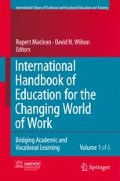When poverty is widespread in urban pockets and severe in rural areas, unemployed and under-employed adults seek solutions to macro-economic changes in several ways: they have to survive for long periods without income; send their children out to work; pull girls out of school; seek assistance from religious institutions; and lean on family relationships (if they have maintained them). Female-headed households are more exposed to deprivation and, therefore, are more likely to send their children out to work. Recent studies refer to the need for a multi-dimensional approach to respond to the particular needs of working children.
Access this chapter
Tax calculation will be finalised at checkout
Purchases are for personal use only
Preview
Unable to display preview. Download preview PDF.
References
Anschutz, J.; Scheinberg, A.; van de Klundert, A. 2006. Addressing the exploitation of children in scavenging: a thematic evaluation. Geneva, Switzerland: ILO/IPEC.
Community and Institutional Development. 2003a. Baseline report on socio-economic conditions of brick factory workers in Arab Abou Saed, El Saff District, Giza, Egypt. Cairo: Egyptian Environmental Initiatives/Fund Canadian International Development Agency. <www.cid.com.eg/>
Community and Institutional Development. 2003b. Final report on youth against exclusion. Paris: UNESCO.
Environmental Management and Technology Fund; Egypt Environmental Initiatives Fund. 2002. Operational manual for clay brick manufacturing in Egypt. Cairo: Ministry of State for Environmental Affairs.
International Center for Environment and Development. 2005. Integrating community based waste management. Cairo: ICED. (Report submitted by Community and Institutional Development on the Business Development Component of the Italian Debt for Development Programme.)
Iskandar, L. 1994. Mokattam garbage village. Cairo: Community and Institutional Development.
Iskandar, L. 2002. Ecological education in the living environment. In: Hautecoeur J.-P., ed. Ecological education in everyday life, Alpha 2000, pp. 21–43. Toronto, Canada: University of Toronto Press, and UNESCO Institute for Education in collaboration with the Canadian Commission for UNESCO.
Iskandar, L. 2005 (Paper presented at the tenth Sardinia International Landfill Symposium, Cagliari, Sardinia, Italy, 3-7 October 2005.) [Unpublished.]
Ministry of Social Affairs; World Bank. 2004. Social Protection Initiatives Program implemented among seven NGOs in Egypt. Cairo: Ministry of Social Affairs.
Author information
Authors and Affiliations
Editor information
Editors and Affiliations
Rights and permissions
Copyright information
© 2009 Springer Science+Business Media B.V.
About this chapter
Cite this chapter
Iskandar, L. (2009). Informal Learning at Work: The Case of Working Children in Egypt. In: Maclean, R., Wilson, D. (eds) International Handbook of Education for the Changing World of Work. Springer, Dordrecht. https://doi.org/10.1007/978-1-4020-5281-1_20
Download citation
DOI: https://doi.org/10.1007/978-1-4020-5281-1_20
Publisher Name: Springer, Dordrecht
Print ISBN: 978-1-4020-5280-4
Online ISBN: 978-1-4020-5281-1
eBook Packages: Humanities, Social Sciences and LawEducation (R0)

